Содержание
- 2. Handling translator’s false friends Give your examples of international words
- 3. Handling translator’s false friends Words that are similar in form but different in meaning are called
- 4. Pseudointernational words Are classified into 2 main groups: Words which are similar in form but completely
- 5. Handling translator’s false friends 2) There are many pseudointernational words which are not fully interchangeable though
- 6. Handling translator’s false friends The translator should bear in mind that a number of factors can
- 7. 1) Semantic factor The semantic factor resulting from the different subsequent development of the words borrowed
- 8. South Vietnam was a vast laboratory for the testing of weapons for counter-guerrilla warfare.
- 9. 2) The stylistic factor resulting from the difference in the emotive or stylistic connotation of the
- 10. 3) The co-occurrence factor reflecting the difference in the lexical combinability rules in the two languages.
- 11. So, a “defect” has a formal counterpart counterpart as «дефект» but “theoretical and organizational defects” will
- 12. 4) The pragmatic factor reflecting the difference in the background knowledge of the members of the
- 13. The American Revolution was a close parallel to the wars of national liberation in the colonial
- 14. The senator knew Lincoln’s Emancipation Proclamation by heart.
- 15. COLLOCATIONAL ASPECTS OF TRANSLATION ATTRIBUTIVE GROUPS there is a considerable dissimilarity in the semantic structure of
- 16. The first group of problems stems from the broader semantic relationships between the attribute and the
- 17. As a result, the translator has to make a thorough analysis of the context to find
- 18. Thus a resolution submitted by an executive body of an organization may be described as "the
- 19. If a word-for-word translation of the name of the executive body (e.g. the «Executive Committee» —
- 20. «резолюция, предложенная исполкомом» and «большинство голосов, поданных за резолюцию, которая была предложена исполкомом»
- 21. The second group of problems results from the difficulties in handling multi-member attributive structures. The English-speaking
- 22. The tax paid for the right to take part in the election is described as "the
- 23. The semantic relationships within a multi-member group need not be linear. Consider the following sentence: “It
- 24. Это был период широкой предвоенной борьбы против фашизма за единый народный фронт в Западном полушарии и
- 25. The same goes for attributive groups with latent predication where a whole sentence is used to
- 26. Here correspondences can also be described in an indirect way only by stating that the attribute
- 27. The Judge's face wore his own I-knew-they-were-guilty-all-along expression.
- 28. На лице судьи появилось обычное выражение, говорившее: «Я все время знал, что они виновны».
- 29. There was a man with a don't-say-anything-to-me-or-I'll-contradict-you face. (Ch. Dickens)
- 30. Там был человек, на лице которого было написано: что бы вы мне ни говорили, я все
- 31. 3) An attributive group may be transformed into a similar group with the help of a
- 32. As a rule, in the Russian translation the meanings of the original group and of the
- 33. 4) As often as not, translating the meaning of an English attributive group into Russian may
- 34. Translate the following attributive groups 1. hearty eater; 2. practical joker; 3. conscientious objector; 4. sleeping
- 35. Translate the following attributive groups
- 36. HANDLING PHRASEOLOGICAL UNITS Phraseological units are figurative set expressions often described as "idioms".
- 37. Five aspects of idioms’ meaning that will influence the translator's choice of an equivalent in the
- 38. The figurative meaning is the basic element of the idiom's semantics: "red tape" means bureaucracy, "to
- 39. The figurative meaning is inferred from the literal sense. "Red tape", "to kick the bucket", and
- 41. Positive "to kill two birds with one stone" idioms Positive "to kill two birds with one
- 42. Bookish (to show one's true colours) Phraseological units Bookish (to show one's true colours) Colloquial (to
- 43. Besides, an idiom can be nationally coloured, that is include some words which mark it as
- 45. Factors which complicate the task of adequate identification, understanding and translation of idioms: - First, an
- 46. Second, a SL idiom may be identical in form to a TL idiom but have a
- 47. Third, a SL idiom can be wrongly interpreted due to its association with a similar, if
- 48. Fourth, a wrong interpretation of a SL idiom may be caused by another SL idiom similar
- 49. Fifth, a SL idiom may have a broader range of application than its TL counterpart apparently
- 50. The children got out of hand while their parents were away. В отсутствии родителей дети совсем
- 51. There are four typical methods to handle a SL idiom in the translating: First, the translator
- 52. Second, the SL idiom can be translated by a TL idiom which has the same figurative
- 53. Third, the SL idiom can be translated by reproducing its form word-for-word in TL, e.g. "People
- 54. Fourth, instead of translating the SL idiom, the translator may try to explicate its figurative meaning,
- 55. GRAMMATICAL ASPECTS OF TRANSLATION HANDLING EQUIVALENT FORMS AND STRUCTURES Grammaticality is an important feature of speech
- 56. They reveal the semantic relationships between the words, clauses and sentences in the text, they can
- 57. The syntactic structuring of the text is an important characteristics identifying either the genre of the
- 58. In many cases, however, equivalence in translation can be best achieved if the translator does not
- 59. For instance, both English and Russian verbs have their infinitive forms. The analogy, however, does not
- 60. We may recall that the English infinitive has perfect forms, both active and passive, indefinite and
- 61. The idea of priority or non-performed action expressed by the Perfect Infinitive is not present in
- 62. Cf. 'The train seems to arrive at 5." - Поезд, видимо, приходит в 5. and 'The
- 63. A dissimilarity of the English and Russian Infinitives can be also found in the functions they
- 64. Parliament was dissolved, not to meet again for eleven years.
- 65. Не came home to find his wife gone.
- 66. Парламент был распущен и не созывался в течение 11 лет. Он вернулся домой и обнаружил, что
- 67. A similar difference can be observed if one compares the finite forms of the verb in
- 68. This port can be entered by big ships only during the tide.
- 69. A most common example of dissimilarity between the parallel syntactic devices in the two languages is
- 70. This order of words is often changed in the Russian translation since in Russian the word
- 71. Thus if the English sentence "My son entered the room" is intended to inform us who
- 72. The predominantly fixed word order in the English sentence means that each case of its inversion
- 73. I. Translate the following sentences with the special attention to the choice of Russian equivalents to
- 74. П. Note the way the meaning of the English passive forms is rendered in your translation
- 75. HANDLING EQUIVALENT-LACKING FORMS AND STRUCTURES A lack of equivalence in the English and Russian systems of
- 76. As a rule, English articles are not translated into Russian for their meaning is expressed by
- 77. Consider the following linguistic statement: 'To put it in terms of linguistics: a sentence is a
- 78. It is obvious that an entity cannot be both a concrete fact and an abstraction. The
- 79. Even if some grammatical category is present both in SL and in TL, its subcategories may
- 80. However, there are many dissimilarities. Much depends on the verb semantics. The Present Perfect forms of
- 81. I have lived in Moscow since 1940. 102 Я живу в Москве с 1940 г.
- 82. The Past Indefinite forms may correspond either to the perfective or to the imperfective Russian forms
- 83. After supper he usually smoked in the garden. После ужина он обычно курил в саду.
- 84. After supper he smoked a cigarette in the garden and went to bed. После ужина он
- 85. The Past Pefect forms may also be indifferent to these aspective nuances, referring to an action
- 86. I hoped he had read that book. (а) Я надеялся, что он читал эту книгу, (б)
- 87. A special study should be made of the translation problems involved in handling the Absolute Participle
- 88. The phrase "How can you play with your brother lying sick in bed" can be understood
- 89. Specific translation problems emerge when the translator has to handle a syntactical complex with a causative
- 90. Depending on the respective status of the persons involved, the phrase "I shall have him do
- 91. Second, the translator must be aware that such complexes are polysemantic and may be either causative
- 92. Either the horse was killed by the general's order (Генерал приказал убить свою лошадь) or he
- 93. Many equivalent-lacking structures result from a non-causative verb used in the typical causative complex. Preserving its
- 94. In such cases the translator has to choose among different ways of expressing causative relationships in
- 95. Администрация США стремилась запугать народ, чтобы заставить его согласиться на милитаризацию страны. Не talked me into
- 97. Скачать презентацию





















































































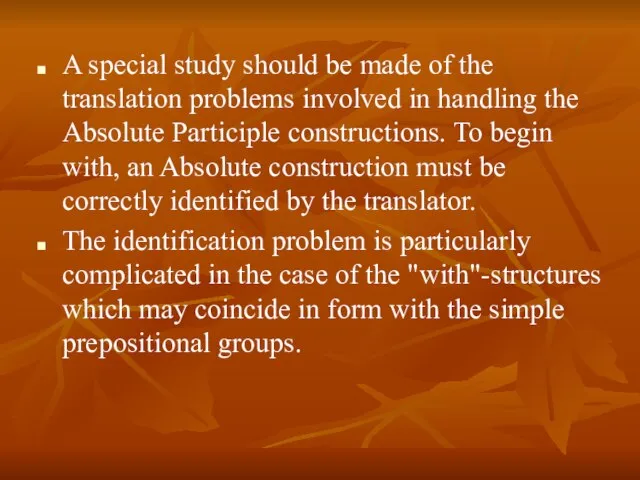
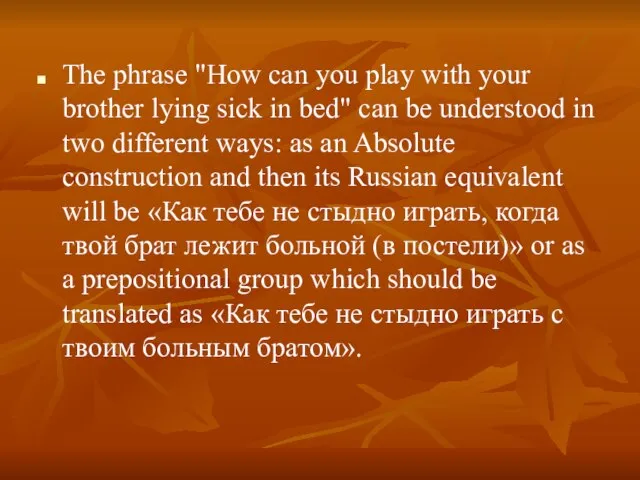
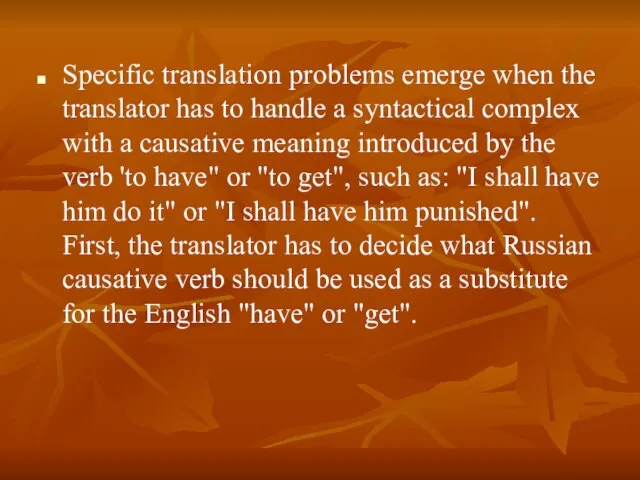
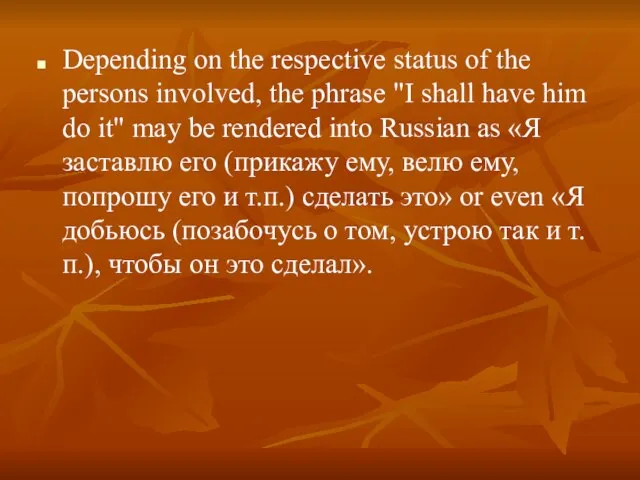
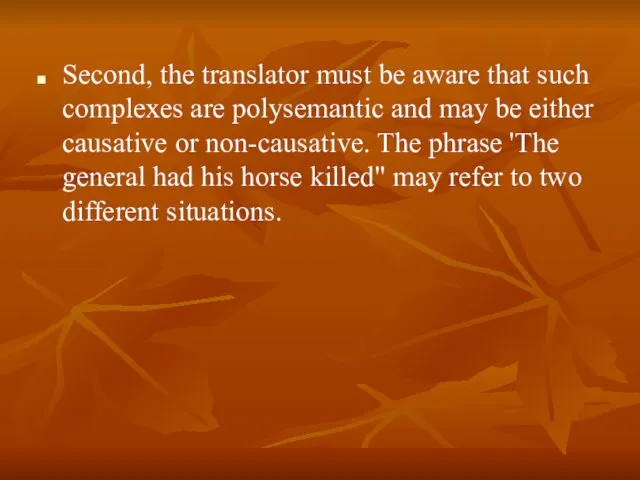
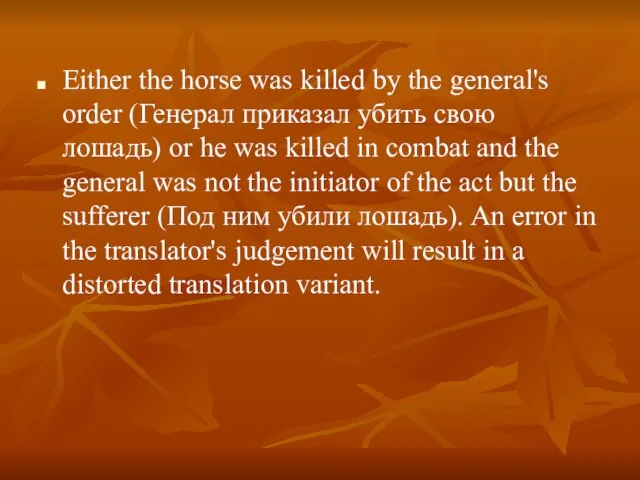
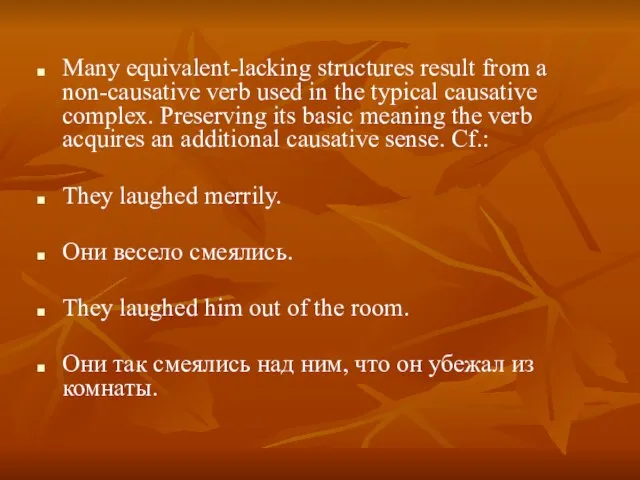
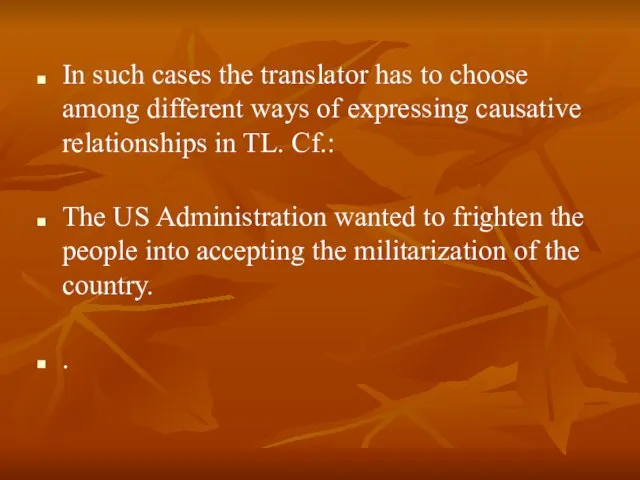
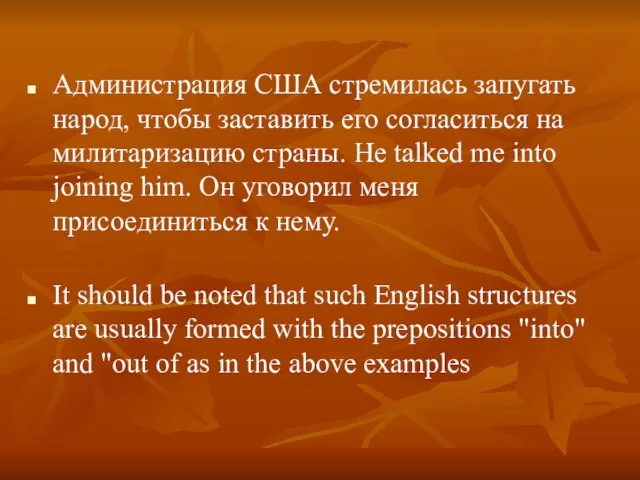
 Структура документа Excel
Структура документа Excel Городской пляж ОАО «Оазис»
Городской пляж ОАО «Оазис» Компьютерные презентации
Компьютерные презентации Презентация на тему Неправильное питание
Презентация на тему Неправильное питание Презентация проектов. Рекламное агентство Креативное бюро Секрет успеха
Презентация проектов. Рекламное агентство Креативное бюро Секрет успеха Михайлова Татьяна Николаевна
Михайлова Татьяна Николаевна Today Learning language
Today Learning language Русская народная вышивка
Русская народная вышивка Золотые руки
Золотые руки Обеспечение карьерного роста в образовательном учреждении
Обеспечение карьерного роста в образовательном учреждении Kids Clothing Ramraj Cotton
Kids Clothing Ramraj Cotton Портфолио учителя
Портфолио учителя Опыт взаимодействия Педагогического STEM-парка и Курского государственного университета
Опыт взаимодействия Педагогического STEM-парка и Курского государственного университета Какую профессию выбрать?
Какую профессию выбрать? Составление текста из предложений
Составление текста из предложений Разработка модельного комплекта для изготовления отливки детали в песчано-глинистой форме
Разработка модельного комплекта для изготовления отливки детали в песчано-глинистой форме VoiceBase.com
VoiceBase.com 6 grudnia Mikołaja
6 grudnia Mikołaja Калининград
Калининград Klassifikatsia_elektropotrebiteley_i_po_stepeni_ikh_nadyozhnosti
Klassifikatsia_elektropotrebiteley_i_po_stepeni_ikh_nadyozhnosti Об организации и объеме оказания лечебной и реабилитационной помощи в государственных наркологических учреждениях Санкт–Пе
Об организации и объеме оказания лечебной и реабилитационной помощи в государственных наркологических учреждениях Санкт–Пе Итоги второго (краевого) этапа ИСО
Итоги второго (краевого) этапа ИСО General anatomy of the опорно-impellent device
General anatomy of the опорно-impellent device Место стратегического управления в общей системе менеджмента и управления предприятием
Место стратегического управления в общей системе менеджмента и управления предприятием Пожары и взрывы
Пожары и взрывы Инновационная политика в Европе: Опыт и уроки европейских инновационных проектов Trendchart и Scoreboard, задачи на будущее Клэр Наувелаер
Инновационная политика в Европе: Опыт и уроки европейских инновационных проектов Trendchart и Scoreboard, задачи на будущее Клэр Наувелаер Александровская колонна на Дворцовой площади
Александровская колонна на Дворцовой площади Татарский танец
Татарский танец